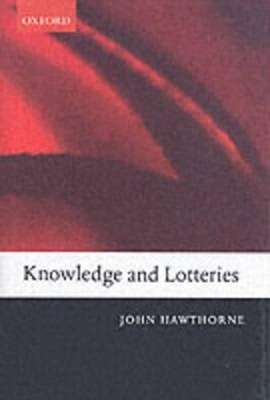
Knowledge and Lotteries
Seiten
2003
Oxford University Press (Verlag)
978-0-19-926955-6 (ISBN)
Oxford University Press (Verlag)
978-0-19-926955-6 (ISBN)
Organized around an epistemological puzzle, this work provides number of specific and general characterizations of the puzzle. It examines the competing merits of candidate solutions, addressing along the way a range of central questions concerning the nature and importance of knowledge.
Knowledge and Lotteries is organized around an epistemological puzzle: in many cases, we seem consistently inclined to deny that we know a certain class of propositions, while crediting ourselves with knowledge of propositions that imply them. In its starkest form, the puzzle is this: we do not think we know that a given lottery ticket will be a loser, yet we normally count ourselves as knowing all sorts of ordinary things that entail that its holder will not suddenly acquire a large fortune. After providing a number of specific and general characterizations of the puzzle, Hawthorne carefully examines the competing merits of candidate solutions. In so doing, he explores a number of central questions concerning the nature and importance of knowledge, including the relationship of knowledge to assertion and practical reasoning, the status of epistemic closure principles, the merits of various brands of scepticism, the prospects for a contextualist account of knowledge, and the potential for other sorts of salience-sensitive accounts. Along the way, he offers a careful treatment of pertinent issues at the foundations of semantics. His book will be of interest to anyone working in the field of epistemology, as well as to philosophers of language.
Knowledge and Lotteries is organized around an epistemological puzzle: in many cases, we seem consistently inclined to deny that we know a certain class of propositions, while crediting ourselves with knowledge of propositions that imply them. In its starkest form, the puzzle is this: we do not think we know that a given lottery ticket will be a loser, yet we normally count ourselves as knowing all sorts of ordinary things that entail that its holder will not suddenly acquire a large fortune. After providing a number of specific and general characterizations of the puzzle, Hawthorne carefully examines the competing merits of candidate solutions. In so doing, he explores a number of central questions concerning the nature and importance of knowledge, including the relationship of knowledge to assertion and practical reasoning, the status of epistemic closure principles, the merits of various brands of scepticism, the prospects for a contextualist account of knowledge, and the potential for other sorts of salience-sensitive accounts. Along the way, he offers a careful treatment of pertinent issues at the foundations of semantics. His book will be of interest to anyone working in the field of epistemology, as well as to philosophers of language.
1. Introducing the Puzzle ; 2. Contextualism and the Puzzle ; 3. Invariantist Treatments ; 4. Sensitive Moderate Invariantism ; Bibliography
| Erscheint lt. Verlag | 1.2.2004 |
|---|---|
| Verlagsort | Oxford |
| Sprache | englisch |
| Maße | 140 x 210 mm |
| Gewicht | 353 g |
| Themenwelt | Geisteswissenschaften ► Philosophie ► Erkenntnistheorie / Wissenschaftstheorie |
| Geisteswissenschaften ► Philosophie ► Sprachphilosophie | |
| ISBN-10 | 0-19-926955-6 / 0199269556 |
| ISBN-13 | 978-0-19-926955-6 / 9780199269556 |
| Zustand | Neuware |
| Haben Sie eine Frage zum Produkt? |
Mehr entdecken
aus dem Bereich
aus dem Bereich
die Grundlegung der modernen Philosophie
Buch | Softcover (2023)
C.H.Beck (Verlag)
18,00 €
Buch | Softcover (2023)
Reclam, Philipp (Verlag)
7,00 €


![Was heißt Denken?. Vorlesung Wintersemester 1951/52. [Was bedeutet das alles?] - Martin Heidegger](/media/113619842)